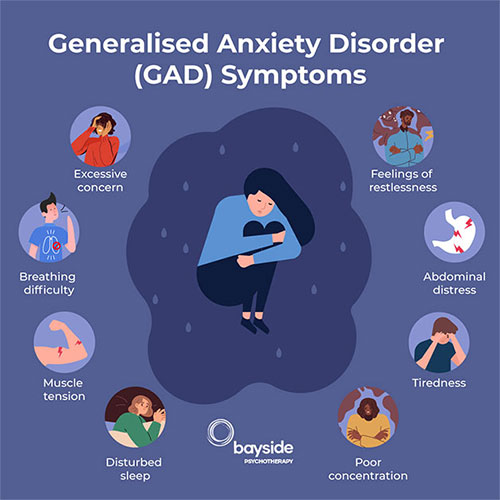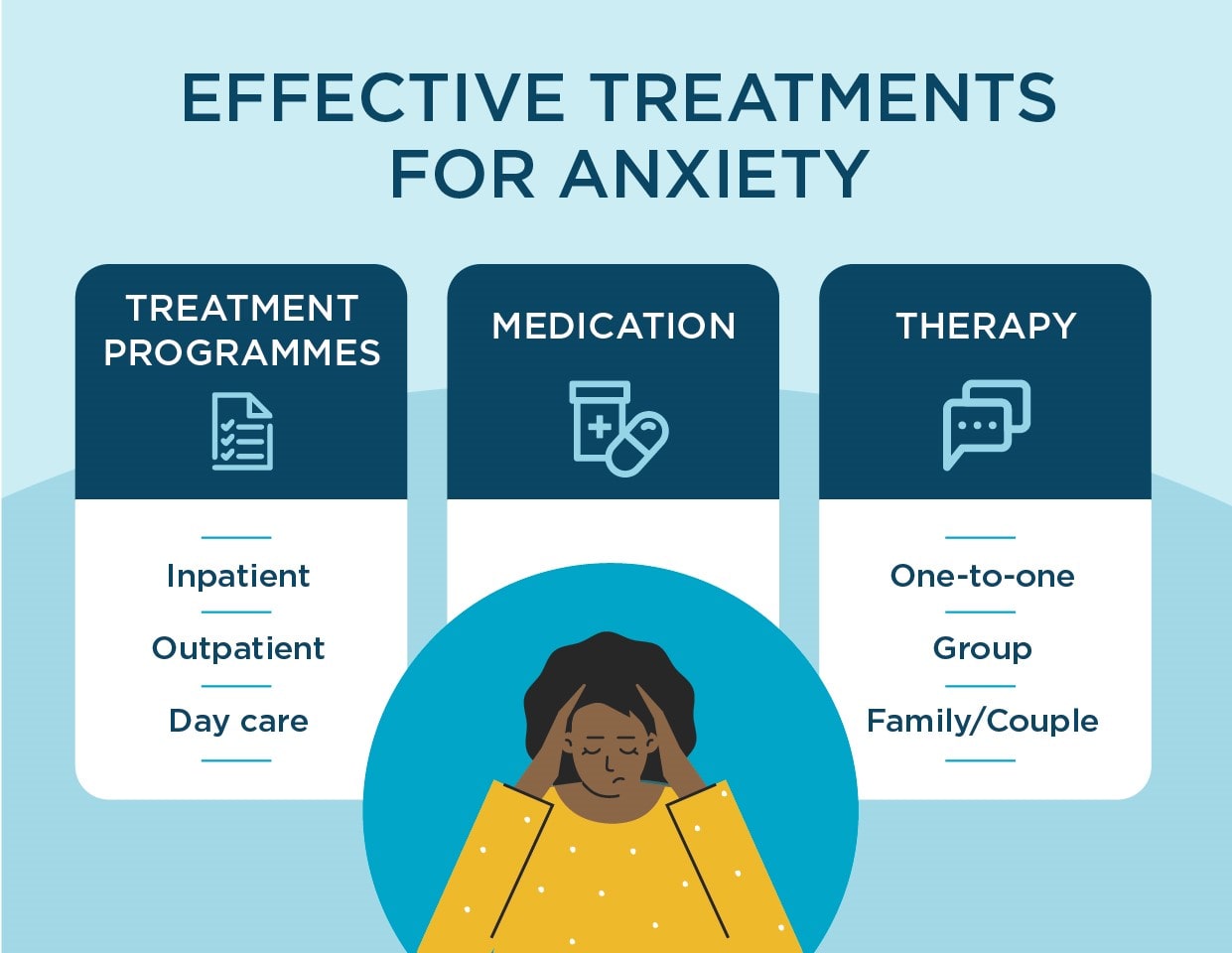Exploring Different Strategies in Counselling for Anxiety Disorder for Long Lasting Modification
When dealing with anxiety disorders, it's vital to discover a range of therapy approaches. Each approach supplies unique understandings and devices to aid you manage your symptoms efficiently. You may find that integrating strategies can yield the finest results. Nonetheless, understanding the nuances of these techniques is crucial to fostering long lasting change. What happens if the appropriate combination could release a brand-new level of psychological health for you?
Understanding Anxiety Conditions: A Brief Summary
Stress and anxiety problems, which influence countless individuals worldwide, can substantially affect day-to-day live. You could experience overwhelming feelings of anxiety or fret that seem uncontrollable. These feelings can lead to physical signs like a racing heart, sweating, or also dizziness. Usual kinds of anxiety problems consist of generalized stress and anxiety disorder, panic attack, and social stress and anxiety disorder. Each has one-of-a-kind indications, however they all share a propensity to disrupt your routine and relationships.Understanding the origin triggers of your stress and anxiety is vital. It may originate from genes, brain chemistry, or life experiences. Acknowledging your triggers can help you handle your responses much better. It is essential to keep in mind that you're not alone in this battle. Many individuals face similar difficulties, and seeking assistance is a strong action toward feeling much better. By learning more about anxiety problems, you're already on the course to understanding and managing your problem better.
Cognitive-Behavioral Therapy: Challenging Adverse Thought Patterns
In Cognitive-Behavioral Therapy, you'll start by recognizing the negative idea causes that contribute to your stress and anxiety. You'll function on changing them with even more favorable options when you recognize these thoughts. Together, you'll develop efficient coping approaches to assist handle your anxiousness in daily situations.
Recognizing Adverse Idea Triggers

Identifying the certain triggers behind your adverse ideas can be crucial in taking care of anxiousness when you run into moments of distress. Beginning by taking note of scenarios that prompt feelings of concern or fear. Is it a crowded room, an approaching target date, or a discussion with particular individuals? Jot down these circumstances in a journal. This will help you recognize patterns in your thinking. Notice physical feelings that accompany your negative ideas, like an auto racing heart or rigidity in your breast. By determining these triggers, you acquire understanding right into what's sustaining your stress and anxiety. Comprehending these links is the primary step in challenging those ideas and ultimately regaining control over your psychological feedbacks.
Replacing Thoughts With Positives
Challenging unfavorable thought patterns is an essential step in changing your attitude and reducing stress and anxiety. You might typically find on your own trapped in cycles of insecurity or catastrophic thinking. Rather than allowing these thoughts determine your sensations, practice replacing them with favorable affirmations or sensible choices. When you assume, "I can't handle this," change it to, "I can manage difficulties one action at a time." This straightforward adjustment can considerably affect your emotional state. Regularly determining and countering these negative thoughts aids create a much healthier interior dialogue. Keep in mind, it takes some time and initiative, yet consistently practicing this method can bring about enduring change, encouraging you to deal with anxiousness with renewed confidence and resilience.
Building Coping Methods With Each Other
Changing unfavorable thoughts is only the start of taking care of stress and anxiety successfully. To create long lasting modification, you need to develop coping techniques that empower you. Cognitive-Behavioral Therapy (CBT) helps you identify and test those purposeless idea patterns. With each other, you and your therapist can check out how these ideas influence your sensations and behaviors.Start by creating sensible methods, like journaling or mindfulness exercises, that allow you to challenge anxiousness head-on. When you encounter your worries gradually, you'll find out to respond differently.

Mindfulness and Acceptance-Based Approaches: Cultivating Present-Moment Recognition
As you browse the complexities of stress and anxiety, incorporating mindfulness and acceptance-based approaches can considerably improve your ability to grow present-moment awareness. By concentrating on the here and now, you'll find that you can observe your thoughts and feelings without judgment (Counseling services for anxiety). This practice helps you recognize your anxiousness without really feeling overwhelmed by it.Engaging in mindfulness exercises, such as deep breathing, body scans, or directed reflections, permits you to ground yourself in your existing experience. Acceptance-based strategies urge you to accept your feelings rather than battle against them. When you approve your feelings, they shed their power over you.Incorporating these techniques into your daily regimen can transform how you reply to stress and anxiety. You'll create resilience and discover to navigate difficult scenarios with greater simplicity. Eventually, growing present-moment recognition lays the structure for lasting adjustment, equipping you to lead a more fulfilling life
Exposure Therapy: Confronting Fears Gradually
Exposure therapy assists you challenge your worries in a steady way, making it less overwhelming. You'll learn methods to encounter anxiety-provoking situations step by step, while likewise building coping techniques to handle your reactions. This technique equips you to take control and lower anxiousness with time.
Steady Direct Exposure Methods

When facing stress and anxiety, gradually facing your concerns can be an effective way to gain back control. This strategy, called progressive exposure, includes slowly subjecting yourself to the circumstances or items that activate your stress and anxiety. Begin with much less intimidating scenarios and slowly work your method as much as more challenging ones. If you're terrified of public talking, you may begin by speaking in front of a mirror, after that progress to sharing ideas with a good friend, and ultimately deal with a tiny group. Each action helps desensitize you to the anxiety, constructing your self-confidence with time. Remember, it's important to rate on your own and celebrate small victories as you relocate with this process, reinforcing your ability to manage anxiousness effectively.
Building Coping Approaches
Building efficient coping methods is necessary for managing anxiousness, particularly as you confront your fears gradually - Counseling services for anxiety. One effective technique is exposure therapy, where you start by facing your fears in a regulated fashion. Start with much less intimidating situations and slowly work your method as much as more challenging scenarios. This progressive exposure assists desensitize you to stress and anxiety activates, making them much less overwhelming.Incorporate relaxation strategies, such as deep breathing or mindfulness, to relax your mind throughout direct exposure. Track your progress, commemorating small triumphes in the process to boost your self-confidence. Bear in mind, it's all right to take your time; the objective isn't excellence yet consistent enhancement. By developing these techniques, you'll empower on your own to browse anxiety and accept life extra totally
Psychodynamic Therapy: Discovering Root Causes of Anxiety
Psychodynamic treatment checks out the unconscious mind, disclosing the origin creates of your anxiety. By analyzing your thoughts, sensations, and past experiences, this strategy helps you uncover underlying conflicts and unsolved problems that might add to your present anxiousness. You'll collaborate with a therapist to check out childhood years experiences, partnerships, and psychological patterns that form your actions today.As you gain understanding into these deeper layers of your subconscious, you'll begin to recognize just how past occasions influence your existing habits. This understanding can lead to catharsis, permitting you to process emotions you could have suppressed.Through the healing relationship, you can additionally identify protection systems that might have created in time, supplying a clearer course to change. Ultimately, psychodynamic therapy furnishes you with the devices to address your stress and anxiety at its core, promoting long lasting makeover in your emotional wellness.
Integrative and Holistic Strategies: Incorporating Techniques for Greater Efficacy
Incorporating numerous therapeutic strategies can enhance your trip towards handling anxiety better. more info By incorporating elements from cognitive-behavioral therapy, mindfulness methods, and alternative techniques, you can create an individualized approach that addresses your one-of-a-kind demands. You could use cognitive-behavioral methods to test negative idea patterns while integrating mindfulness exercises to ground yourself in the present moment.Additionally, checking out holistic techniques such as yoga or reflection can promote leisure and reduce anxiousness signs and symptoms. This blend allows you to develop greater self-awareness and resilience.Experimenting with these diverse methods can aid you discover what reverberates most with you. Bear in mind, it has to do with locating a synergy that functions, instead than staying with a single strategy. This integrative strategy not only uses immediate relief however likewise fosters lasting skills for taking care of anxiety, encouraging you to recover control over your life.
The Duty of Support Systems: Structure Resilience Via Link
While it could seem that managing anxiousness is a singular trip, having a solid support system can play a necessary duty in your resilience. Surrounding on your own with empathetic good friends, household, or support groups produces a safe room where you can openly share your feelings and experiences. You advise yourself that you're not alone in this struggle.These relationships offer encouragement and can offer functional coping methods that have worked for others when you connect with others. It's additionally a possibility to gain point of view; buddies can aid you see situations in different ways, minimizing sensations of isolation.Moreover, psychological support fosters a sense of belonging, which can greatly relieve anxiety signs and symptoms. By leaning on your support group, you can develop durability and tackle obstacles much more successfully. Remember, reaching out for assistance signifies toughness, and it can make all the distinction in your journey towards handling stress and anxiety.
Frequently Asked Concerns
What Are the Common Symptoms of Anxiety Conditions?
You may experience restlessness, tiredness, trouble focusing, impatience, muscle tension, and sleep disruptions. Physical signs can include quick heartbeat, sweating, and trembling. Recognizing these indications early can assist you look for suitable assistance and therapy.
Just How Long Does Treatment Typically Last for Anxiousness Conditions?
Therapy for stress and anxiety conditions generally lasts anywhere from a couple of weeks to several months. It actually depends on your individual needs, progression, and the techniques your therapist uses to help you handle your anxiousness efficiently.
Can Drug Be Used Along With Therapy for Stress and anxiety?
Yes, medicine can certainly be used alongside treatment for anxiety. Integrating both methods frequently enhances therapy efficiency, helping you handle signs while exploring underlying concerns with therapy (Counseling services for anxiety). Constantly consult your doctor for customized guidance
Exist Self-Help Methods for Handling Anxiety?
Yes, there are several self-help techniques for handling anxiousness. You can practice mindfulness, take part in normal exercise, maintain a balanced diet, develop a routine, and use deep breathing methods to help decrease anxiousness signs efficiently.
Just how Do I Know if I Need Specialist Help for Anxiousness?
